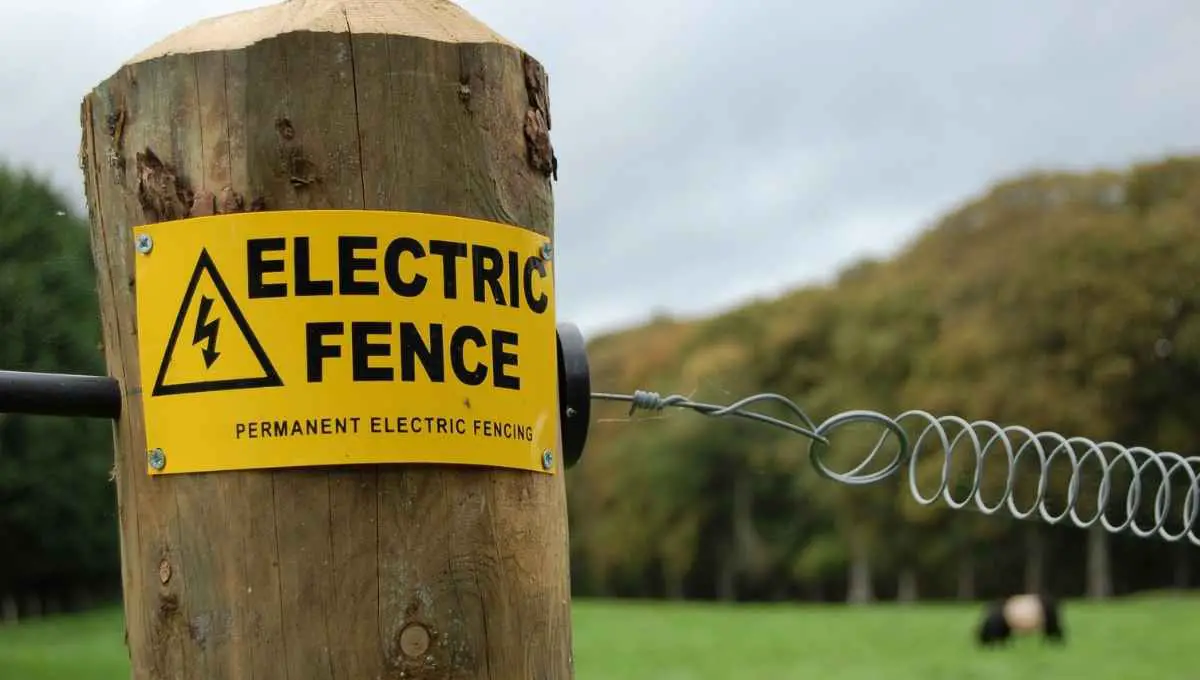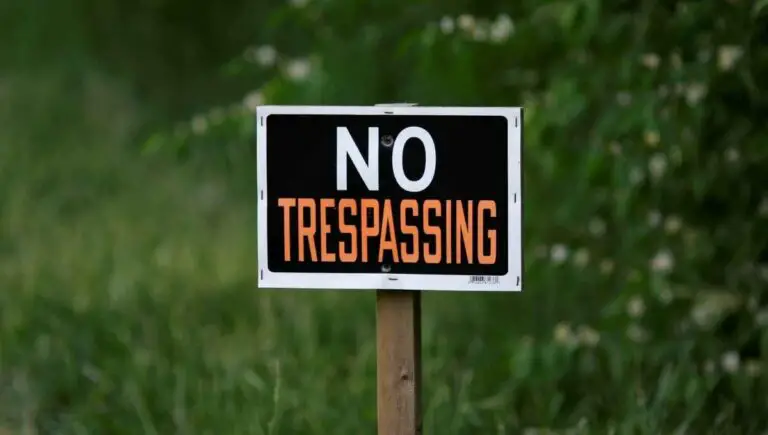Can I Have an Electric Fence Around My Property Legally?

Electric fences are an efficient way to keep critters or other unwanted visitors out of your yard. It may have crossed your mind to install one lately but, since electric fences are dangerous, you’re also probably wondering if they are legal to have on your property.
Electric fences are legally allowed in the United States but each city has its specific bylaws concerning electric fences. It can therefore be tricky to determine the legalities across the board. You should always check with your city’s bylaws before installing an electric fence.
Thankfully, we have made this process easier for you by unpacking all the specific details of electric fence regulations. After you finish reading this article, you shouldn’t have a problem deciphering whether or not you are allowed an electric fence around your property.
This post contains affiliate links from Amazon and other stores. This means Yard Blogger may earn a commission if you make a purchase using any of our links. Please refer to our full affiliate disclosure policy for full details.
Here’s a Quick Pro Tip!
Installing an electric fence requires you to abide by a LOT of regulations, depending on where you live, to ensure your safety and the safety of others.
However, no matter where you live, you will always need to put warning signs up on your electric fence.
Get a head start on the list of regulations by purchasing these warning signs from Amazon.
They are exactly what permit holders will look for and will give you a head start in installing your electric fence.
Disclaimer: The information contained in this article is provided for informational purposes only, and should not be interpreted as legal advice or acted upon as such.
Yard Blogger cannot be held responsible for any damages or dangers caused by action taken by readers based on the contents of the website. You should always consult with an attorney or legal professional before taking any action.
Electric fencing laws and regulations vary between states and cities. Always check with your county’s bylaws before you install an electric fence.
Can I Put an Electric Fence Around My Yard?
Putting an electric fence around your yard is illegal in most states in America if the fence runs directly along another property – such as your neighbors -, a roadway, or a park.
Even in rural areas, if your electric fence is adjacent to a road or another private property, it is there illegally.
You will have to allow a certain amount of footage in between your fence and another property to have your fence legally installed to avoid any penalties.
When Is It Legal To Put Up an Electric Fence?
Requirements for putting up an electric fence will depend on where you live but, in most cases, it is legal to put up an electric fence if it is solely on your private property, and does not run along any property lines or public roads.
If you live in a rural area, you also have a better chance of being able to put up an electric fence legally, especially if it is to contain livestock.
If you live in a residential area, you may be allowed to put up an electric fence (if allowed by your bylaws) when the electric fence is contained within your property, such as around a garden.
But, when the electric fence is surrounding your whole yard, it is likely that this is only legal if you place the fence a few feet away from the property line and place several warning signs on the fence.
You might also enjoy our post on Can an Electric Fence Kill a Dog?
Are Electric Fences Legal in the United States?
Electric fences are legal in the United States as long as you follow your area’s bylaws. The laws vary between states and cities so it is absolutely crucial that you follow the rules so you don’t end up getting in trouble with the law.
Electric fences are useful ways to protect your yard or your livestock from unwanted critters.
But, sometimes, they are not appropriate in certain areas because the risk of causing harm is too much to outweigh.
Most always an electric fence will be illegally installed if it is located on a property line, or right beside a public road or highway.
Are Electric Fences Legal in Ontario?
Electric fences are only permitted on farmland for the protection of livestock all across Canada, including Ontario. They are not legally allowed to be used anywhere else. If you get caught with an electric fence in Canada illegally you may face charges.
Canada has more strict laws when it comes to electrical fencing compared to the United States.
A country-wide law states that you are only allowed to install electrical fences in Canada if it is on farmland and follows the other strict requirements regarding voltage, height, and attached warning signs.
You might also enjoy our post on Can an Electric Fence Kill a Chicken?
Electric Fence Legal Requirements
The legal requirements for an electric fence will depend on where you live since the laws vary by state and county. However, in most cases, electric fences are allowed in rural areas in America, and in some states, they are allowed in your private yard.
Yet, there are many requirements that must be followed if you want to have an electric fence. Generally, the electric fence can not be on a property line or beside a public road or highway.
Also, if you live in a highly populated city it’s not likely you will be allowed to install an electric fence in your yard.
Always check with your city’s bylaws before you install an electric fence to ensure you follow all the guidelines.
Electric Fence Sign Requirements
When you install an electric fence legally, you have to place electric signs on the fence to warn people that the fence is electric. These signs are bright yellow, display “WARNING”, and “DO NOT TOUCH” messages. They have to be typically three feet apart from each other along the whole length of the fence.
Warning signs really help people identify a fence as an electric fence. Some electric fences look like typical wire fences and you only find out it’s electric once you touch it and receive a surprising shock.

Can You Put in an Electric Fence Legally?
You should always check with your county’s bylaws before you put in an electric fence. However, under most circumstances, you are allowed to install an electric fence if the fence does not run along any property lines. The fence has to be a specific distance behind property lines and not adjacent to any public roads or highways.
You also may have to obtain a permit depending on your county that requires several different conditions. For example, in Pittsburgh, you are allowed to install an electric fence once you obtain a permit from the planning commission.
The planning commission will conduct a public hearing and consider each request. You are only allowed to install your electric fence once it is approved by the commission.
Key Points of Conditions for Installation:
- Location
- Perimeter fence or wall
- Height
- Warning signs
- Key box
- Hours of activation
- Energizer
Can I Put an Electric Fence in My Garden?
Putting an electric fence around your garden is typically allowed depending on where you live and where your garden is located in your yard. Always check your county’s bylaws before you consider installing an electric fence.
Electric fences are an ideal way to keep critters out of your garden.
You have a better chance of being allowed to put in an electric fence for your garden if your garden is in your backyard and does not run along any property lines.
If you live in the city, you may have to put an extra fence around your yard before you are allowed to install an electric fence.
You might also enjoy our post on Can Plants Touch an Electric Fence?
Can I Install an Electric Fence on Private Property?
You can install an electric fence on private property, but keep in mind that regulations vary depending on where you live. However, it is possible to do so, you just have to ensure that you follow the rules so you don’t get in trouble.
People are generally allowed to install electric fences on private properties if their county allows this if they obtain a permit, if they are planning to not put the fence on property lines, and if they put warning signs on the electric fence.
Electric fences are also more likely to be allowed if you live in a rural area as opposed to a residential area or city.
Do You Need a Permit for an Electric Fence?
Permits for an electric fence are not universal, it depends on where you live- some cities require it and some don’t. Always check with your city’s website or call your local city hall to obtain the most accurate information. This is important because you could end up in trouble with the law if you don’t obtain a permit where it is necessary.
Permits ensure that you are following your county’s bylaws. They are needed to protect animals and humans from potentially harming themselves since electric fences can be dangerous, especially to children.
The permit will outline:
- How tall your fence can be
- Where it can be placed if you need to put signs on the fence
- If you need to have a lockbox on your fence
- How many watts the fence can emit.
How Long Is an Electric Fence Compliance Certificate Valid For?
The length of validity for an electric fence compliance certificate will depend on where you live and who issues the valid but generally, they are valid for two years or longer. If a property is sold, the valid has to be renewed by the new owner.
Receiving an electric fence compliance certificate valid is not only the law (sometimes) but also ensures that your electric fence is in good condition.
These permits need to be renewed so that safety can continue to be ensured.
What Is the Minimum Height for an Electric Fence?
An electric fence should be at least 4 feet high, depending on what you are trying to keep out. For smaller animals, 4 feet is ideal. If you are installing an electric fence for chickens, then go with a 6-foot fence.
You want your electric fence to be high enough so no animal (or human) can jump over it.
Do not place your electric fence beside a tree or any obstacles that can be used as a jumping platform, such as a box or tree stump.
You might also enjoy our post on Can an Electric Fence Kill You?
Electric Fences in Rural Areas
If you live in a rural area, you are more likely to be able to install an electric fence legally. Since properties in rural areas are larger, you have more space in between property lines to legally install the fence. There are also fewer people to have to worry about who may electrocute themselves.
However, you still may need to obtain a permit to install your electric fence depending on where you live.
Common laws include not being able to install your electric fence along a public road or highway and not directly on property lines of another private property.
Electric fences are allowed on private properties as long as you have enough room between the next property. In rural areas, this is generally not a problem.
Electric Fence in City Limits
Whether or not an electric fence will be allowed within city limits depends on which city and what the bylaws outline. Electric fence laws differ between cities but it is legal in America to have an electric fence in a city, so, you just have to check with your bylaws to make sure it is allowed.
However, electric fence laws are more strict within the city compared to rural areas.
This is because there usually is not enough room between houses and a lot of public areas such as schools and parks that need to be considered.
Get in touch with your city council to learn if you can install an electric fence.
Electric Fence on Property Line
An electric fence installed on a property line is illegal in most states in America. The fence needs to be at least a few feet behind the property line to protect the health of humans and pets and likely protected by another fence that is not electric.
Most electric fence bylaws state that it is illegal to put an electric fence on a property line. This is just too dangerous for anyone, especially children.
You don’t want to have to worry about anyone in your family accidentally running into the fence and getting electrocuted, even though it’s not likely the fence will kill you, it’s just not an ideal situation.
If your neighbor has an electric fence on your property line, you should inform them that this is not legal. If they know that and are doing it anyway, report them to the police. The police will force them to take it down.
Electric Fence To Protect Property
You are allowed to install an electric fence to protect your property as long as you abide by your county’s bylaws. It’s important to do your due diligence so you don’t end up breaking any laws. Check with your city’s website or call your city hall to find out if you’re allowed an electric fence in your area.
If you live in the city or in a residential area, your chances of installing an electric fence are less likely, especially around your whole property.
Typically, you are only allowed electric fences around a specific part of your property, such as around chickens or a garden.
It is too dangerous to your neighbors and harmless animals to have an electric fence around your whole property.
If you live in a rural area, you may have a better chance since you have more area to work with.
As long as your electric fence isn’t directly on a property line or adjacent to a public road or highway, you may be more in the clear- but still check with your area’s bylaws and obtain a permit if you need to.
You might also enjoy our post on Can Your Neighbor Steal Your Electricity?
Do Electric Fences Work on Humans?
Electric fences certainly do work on humans. Not only do they scare humans off but they also emit quite the shock that most humans are not strong enough to withstand. If you want to protect your yard, then an electric fence is a good idea.
Before you install your electric fence, make sure you check with your city’s bylaws to find out if they are allowed in your area.
There are some tight restrictions with electric fences and if you don’t follow them you may end up in trouble with the law.
Electric Fence for Trespassers
If you want to keep trespassers out of your property, then an electric fence is an effective option for this. Not only do they deter trespassers but the electric shock is usually too strong for a human to withstand.
However, electric fences that are made to keep trespassers out may be difficult to have in a city because of the extent of restrictions that exist. If you live in a rural area, it may be easier.
Make sure to check with your area’s bylaws to find out if you are legally allowed to install an electric fence.
Toddler Touched Electric Fence
If your toddler touched an electric fence, you should take them to a pediatrician as soon as you can. A toddler feels an electric shock twice as much as an adult does. Even though you don’t see any physical damage, it doesn’t mean there isn’t any internal physical damage.
Your pediatrician will examine your toddler to ensure that none of their systems got affected. It’s possible that your toddler is totally fine, regardless of how much they are crying.
The shock can cause quite an excitement for your toddler so try to calm them down as much as you can.
Are Electric Fences Authorized?
You usually have to get a permit to have your fence authorized since there are many regulations regarding electric fences in residential and even rural areas. Laws vary between cities so make sure to check with your city’s bylaws before you install an electric fence.
Good news though, electric fences are authorized in the United States as long as you follow the specific requirements.
This usually consists of not having an electric fence directly on a property line or right beside a public road or highway.
Electric fences are normally authorized when they protect only a small part of your backyard or if you live in a rural area.
Laws Regarding Electric Fences
Laws regarding electric fences vary between states and even counties within that state. In most cases, electric fences are not allowed in highly populated areas like cities or large towns. Laws are less strict in rural areas especially when the electric fences are being used to contain livestock.
The more consistent laws between states are that electric fences cannot run directly on a property line or beside a public road or highway.
They also have to be below a certain height, below a certain wattage, and have a lockbox that police can access in case of an emergency.
Always check with your county’s bylaws before you consider installing an electric fence so you don’t waste any time or money.
Neighbors Electric Dog Fence on My Property
If your neighbor’s electric dog fence is on your property, you should discuss with them that you have an issue with this. Not only is this illegal, it’s also dangerous for you and your family.
Let them know the issues you have with the fence being on your property. If they are receptive to this then they should move the dog fence.
If they are not receptive, then you can always go to the police and let them know of the situation. The police will pay a visit to your neighbors and let them know what they are doing with the fence is illegal.
Usually, this is enough for them to move it.
Is It Illegal To Have an Electric Fence Around My Property?
Laws regarding electric fences around your property differ between states in America. Some states allow electric fences in rural areas, especially if they’re being used to contain livestock. Generally speaking though, property-wide electric fences are illegal in most states if you live in a population-dense area.
Electric fences are typically only allowed to protect a small area of your property, such as an area for your chicken or around a garden. On the other hand, having an electric fence around your whole property is not usually legal.
This poses too much of a risk for people or animals to get harmed by the fence.
If you desperately want to put in an electric fence around your property, consult with your city to find out the bylaws. You may be able to follow every requirement and legally install your electric fence.
What Is the Law on Electric Fences?
The law on electric fences depends on where you live since they differ between each state and even counties. Most cities and large towns will not allow electric fences to protect people, especially children. However, if you live in a rural area, you are more likely to be allowed to install an electric fence.
Seek information from your city or town’s council to find out the specific laws for your area for installing an electric fence.
To save you time, it is not allowed to have an electric fence on a property line or beside a public road or highway, and in major cities or large towns with population-dense areas.
What Is the Punishment for Illegally Installing an Electric Fence?
You will face a fine for installing an electric fence illegally. The fine may vary depending on where you live but generally, the fine is not too steep. Also, you may get lucky and only get a warning.
Fines for installing an electric fence are never too steep but it all depends on where you live. For example, in Maine, the fine is no more than $100 and or imprisonment for less than 9 days.
To avoid any legal punishment, get in touch with your area’s bylaws to ensure you are following regulations.
When Is It Legal To Install an Electric Fence?
You can install an electric fence legally if you do your due diligence by consulting with your county’s bylaws and following their regulations. The laws of electric fences vary from city to city so it’s important to make sure what applies to you.
However, in most cases, you are legally allowed to install an electric fence if it does not run along a property line or beside a public road or highway.
This is to protect your neighbors and pedestrians from getting accidentally electrocuted. But beware, some cities ban electric fences altogether if it is a densely populated city.
Regulations on Electric Fencing in Residential Areas
Regulations on electric fencing in residential areas will differ between cities, but, in general, regulations are much more strict for electric fencing in residential areas compared to rural areas. While electric fences offer privacy and protection, in highly populated areas, they can cause more harm than good.
Always check with your county’s bylaws to learn the specific regulations you have to allow to legally install an electric fence.
For example, this is a document outlining all the electric fence regulations for Albany, Oregon- a city of 50,000 people.
It specifies which areas of Albany are allowed electric fences, how high they can be if you need to obtain a permit and wherein your yard they can be installed.
You can purchase these electric fence signs from Amazon which fulfill all sign requirements.
How Far Apart Do Electric Fence Signs Need To Be?
The length of your fence will depend on how many electric fence signs you need to put up. If you have an electric fence for cattle, then your signs need to be 60 feet apart. If you have a fence in a city area, then you need to have at least two signs.
Although electric fences are an effective way to keep unwanted visitors out, they are dangerous and painful if anyone accidentally touches one.
No matter what the regulations say, you should use your common sense when it comes to displaying warning signs. Use as many as you think you need to properly warn people.
Related Questions
Can You Put an Electric Fence on a Chain Link Fence?
You can put an electric fence on either the bottom or top of a chain-link fence or both. If, for example, you have a dog that is digging under your chain link fence, you can install an electric fence to the bottom of it. If the dog is jumping over, install an electric fence on top.
However, keep in mind that as soon as you make your chain link fence electric, you have to abide by electric fence regulations.
Your once chain link fence is now considered an electric fence so consult with your city’s bylaws to make sure you follow the regulations.
You might also enjoy our post on Neighbors Dog Digging Under My Fence
Is Electric Fencing Legal in California?
Electric fencing is legal in California depending on where you live in the state and if you abide by the set-out regulations. Unfortunately, if you live in a residential area in California, then an electric fence is not allowed.
For the rest of the state, you must follow the regulations they have listed.
These regulations outline that you have to have warning signs on the fence, the height of the fence cannot exceed 10 feet, and the fence has to meet electrotechnical and local requirements.
Are Electric Fences Worth It?
Electric fences are an effective way to keep critters out of your yard or unwelcome trespassers. However, regulations are strict so you have to decide if you want to navigate all the laws in order to install your electric fence.
On top of the regulations, you have to consider if the cost is worth it. Not only will you spend money on the physical fence, around $1000 USD, but you will also have to pay installation fees and permit fees.
In the end, this could cost you around $2000.
Speaking of unwanted visitors, check out what to do if you notice a suspicious car in front of your house!
How Long Does It Take To Install an Electric Fence?
If you are installing a small electric fence around your garden, for example, this will take you about three hours. Of course, the more people you have helping you, the shorter time it will take. Also, the longer your electric fence, the longer it will take.
If you are installing an electric fence for cattle, you can expect this will take you at least a day, since you are covering a lot of ground.
Installing an electric fence involves setting up the charger, putting in posts, and unraveling the fence, so allow yourself a good amount of time.
Final Thoughts
By now you understand that electric fence laws are complicated but, for good reason. Your city is only trying to protect its residents as much as possible.
But, don’t be discouraged. There may be hope that you are allowed an electric fence around your property, so always check with your city’s bylaws, abide by the regulations, and you should be able to keep those unwanted critters away.







